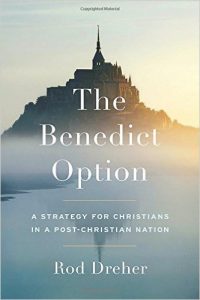Fearing Dreher: Why the Benedict Option Scares Christians
by Thomas Ascik, The Imaginitive Conservative:
Even those critics friendly to Rod Dreher’s Benedict Option have failed to take its implications seriously, likely because they are afraid to take the concrete steps he suggests to preserve their Christian way of life in this country…
 Does the United States need Christianity or at least the conventional morality based on Christianity? Until the last fifty years—that is, since the sexual revolution—Christian morality was still mainly both the personal and the social norm. Even the American Enlightenment and deist tradition did not think anything else was possible.
Does the United States need Christianity or at least the conventional morality based on Christianity? Until the last fifty years—that is, since the sexual revolution—Christian morality was still mainly both the personal and the social norm. Even the American Enlightenment and deist tradition did not think anything else was possible.
Deist Thomas Jefferson, America’s pre-eminent son of the Enlightenment, called himself “a real Christian” (despite denying the divinity of Christ) and called Jesus’ moral teachings “the most sublime and benevolent code of morals which has ever been offered to man.”[1] Fellow Enlightenment deist Benjamin Franklin called Jesus’ “system of Morals and Religion, as he left them to us, the best the World ever saw.”[2] In Federalist 2, John Jay speaks of the religious and cultural unity of the new states, saying that they “[profess] the same religion.” And in his Farewell Address, George Washington said that “virtue or morality is a necessary spring of popular government” and that “religion and morality are indispensable supports” of “political prosperity.” Variations of these statements have occurred throughout American history.
Rod Dreher, in his much-discussed The Benedict Option: A Strategy for Christians in a Post-Christian Nation (2017), asserts that we are living in “post-Christian America.” It seems that no one, whether on the left or right, disagrees with this assessment, from liberal critic Emma Green (“Christianity is no longer the cultural default”), to conservative writers Fr. Dwight Longenecker (“the tsunami of anti-Christian culture”) and New York Times columnist Ross Douthat (“traditional religion in all its forms has become a counterculture in the West”), to Patrick Gilger (“Christian America is already a contradiction in terms”) and Damon Linker (“a minority in a majority secular nation”) also agree.[3]
So, how should Christians react to the widely acknowledged reality that Christendom—that is, civilization and culture based on Christian principles and morality—is dead? Mr. Dreher says that “Christians are now in a time of decision,” and he calls on them to take concrete steps to preserve their Christian way of life in this country. Almost all the reviews of Mr. Dreher’s book concentrate on and criticize his supposedly monastic and society-denying “option” and downplay his very uncomfortable assessment of the need for that option. This review does the opposite.





